When it comes to roof tiles types, there is a wide array of materials and designs available to suit various styles of architecture and functional requirements. In this article, we’ll investigate the particulars of a wide variety of roof tiles types, considering their pros and cons as well as exploring factors that affect design decisions.
We will discuss traditional options such as slate, clay, and concrete tiles along with modern alternatives like composite slate or metal roofing systems. Furthermore, we’ll touch upon environmentally friendly solutions including solar roof tile and synthetic tile roofing systems.
By the end of this comprehensive guide on roof tiles types, you’ll be equipped with valuable knowledge that can assist in making informed decisions when selecting the most suitable material for your next roofing project.
Table of Contents:
- Slate Roof Tile
- Metal Roof Tiles
- Concrete Roof Tiles
- Composite Slate Roof Tile
- Solar Roof Tile
- Clay Roof Tiles
- Synthetic Tile Options
- Choosing a Professional Contractor
- FAQs in Relation to Roof Tiles Types
- Conclusion
Slate Roofing Tiles
Slate is a natural stone that offers fire resistance and long-lasting durability, and one of the classiest roofing materials type. Due to its weight, additional reinforcement may be needed for the structure in order to support it. This type of roof tile can last for over 100 years when installed in appropriate climate conditions.
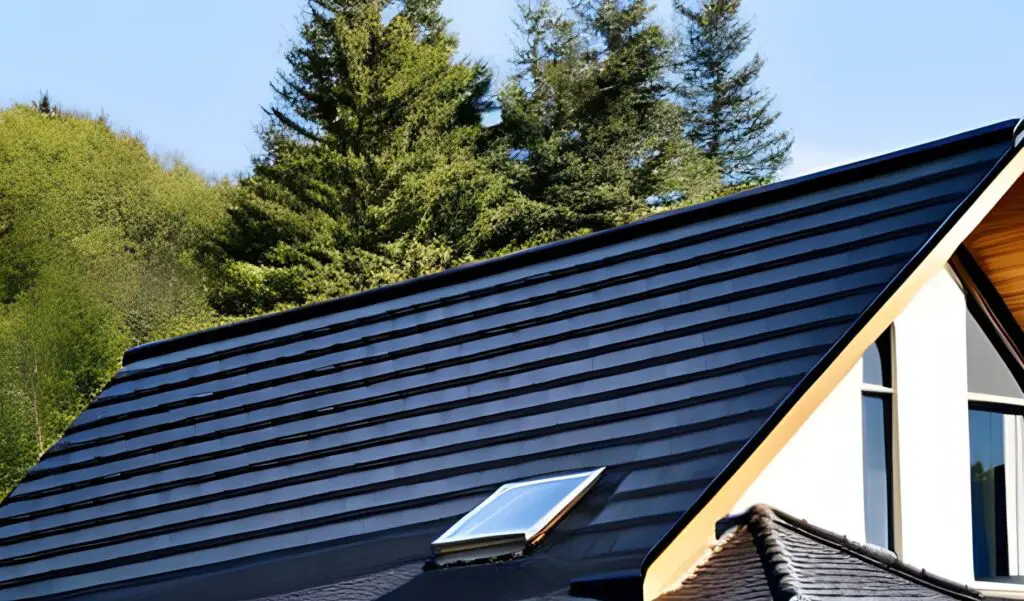
Advantages of Slate Roofing Tiles
- Durability: Slate roofs are known for their longevity, often lasting more than a century with proper maintenance.
- Fire Resistance: As a natural stone material, slate provides excellent protection against fires.
- Aesthetic Appeal: The unique appearance of slate adds an elegant touch to any style of architecture, making it a popular choice among homeowners and architects alike.
Structural Reinforcement Requirements
To accommodate the heavy weight of slate roof tile, additional structural reinforcements may be necessary. Before installing this type of roof materials on your home or building project, consult with a professional engineer or architect who can assess whether your existing framing system can handle the added load. If not, they will recommend suitable modifications or alternative roofing options that better suit your needs and budget constraints.
In addition to reinforcing the structure itself, you should also consider hiring an experienced professional contractor, as working with these materials requires specialized skills and expertise. A properly installed slate roof will not only enhance the beauty but also significantly increase the value of your property while providing reliable protection from various weather elements such as rainstorms or hail damage throughout its lifespan.
Slate roof tile are an attractive and long-lasting option for any building, but they come with some structural reinforcement requirements. Metal roofing systems possess their own distinct advantages and drawbacks that ought to be thoughtfully evaluated prior to making a choice.
Metal Roof Type Tile
Metal tiles are gaining popularity and fast becoming one of the popular types of roof tile, due to their lightweight and ease of installation. These roof tiles types, metal tiles are particularly suitable for hot weather climates where exposure to salt air is common, but they may not be the ideal choice for every homeowner. In this section, we will discuss the benefits and drawbacks associated with metal roofing systems.
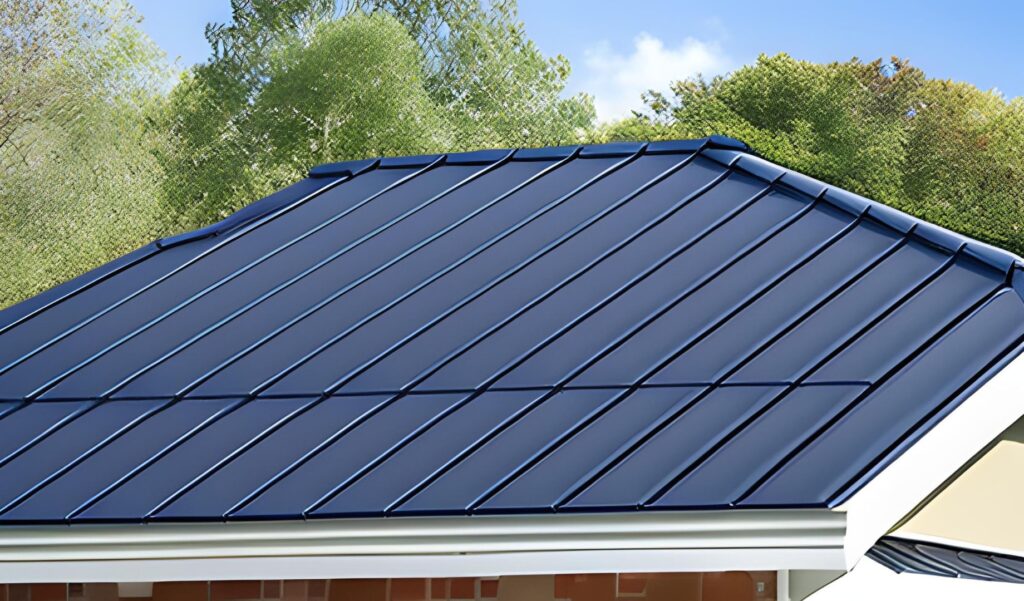
Benefits of Metal Roofing Systems
- Durability: Metal roofs can last up to 50 years or more with proper maintenance, making them a long-lasting option compared to other roof materials.
- Energy Efficiency: They reflect sunlight effectively, reducing energy costs during summer months by keeping your home cooler.
- Eco-friendly: Many metal materials are made from recycled content and can also be recycled at the end of their lifespan.
- Variety: With a wide range of color options available in different styles like standing seam or corrugated panels, homeowners have numerous choices when it comes to selecting an aesthetically pleasing design that complements their style of architecture.
Drawbacks Related to Noise and Denting
The primary concerns regarding metal roof tile include noise levels during rainstorms and susceptibility to denting. Raindrops hitting the surface create a noticeable sound which some people find bothersome; however, installing insulation beneath the roof deck can help reduce noise transmission into living spaces below.
Additionally, while metal is generally durable against harsh weather conditions such as hail storms or high winds, dents might still occur if struck by large debris like tree branches falling onto your rooftop. Regular inspections by a professional roofing contractor can help identify and address any potential issues before they escalate into more significant problems.
In conclusion, metal roof tile offers several advantages for homeowners seeking durability, energy efficiency, and eco-friendliness. However, it is essential to consider the drawbacks related to noise and denting when deciding if this type of roof is suitable for your home.
Metal roofing is a wise choice for those aiming to invest in long-lastingness and protection from the elements. However, the drawbacks related to noise and denting should be taken into consideration before making any decisions. Moving on, concrete roof tile offers another durable solution with additional reinforcement needs for supporting heavyweight materials.
Key Takeaway:
Metal roof tile is becoming more popular due to its durability, energy efficiency and eco-friendliness. However, homeowners should be aware of the potential drawbacks such as noise during rainstorms and susceptibility to denting from large debris. Regular inspections by a professional contractor can help address any issues before they become significant problems.
Concrete Roof Tile
Concrete roof tile offer durability but require a reinforced structure due to their heaviness. They have impressive lifespans, often exceeding 100 years when installed in appropriate climate conditions, making them an excellent choice for long-term investment protection.
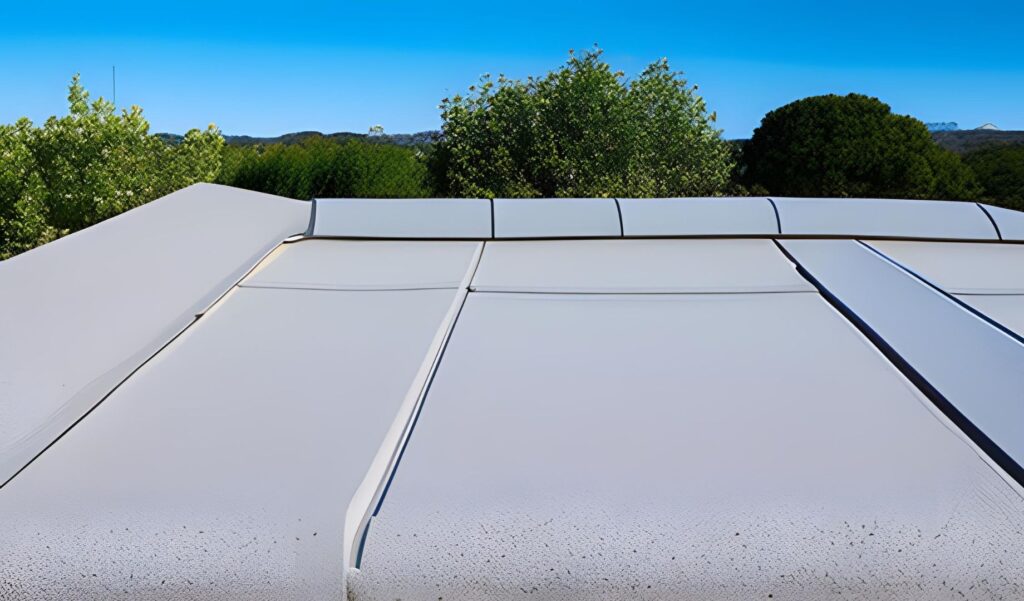
Durability Factors of Concrete Roof Materials
Concrete roof tiles are renowned for their robustness and ability to endure inclement weather, such as gales, hailstorms, and torrential rain. These tiles are made from a mixture of cement, sand, and water, which is then molded into the desired shape before being cured under heat or pressure. The final product is resistant to rotting, insect infestation, and fire damage – all factors that contribute to its long-lasting nature.
- Fire resistance: Concrete tiles are non-combustible and can help slow down the spread of flames in case of a fire outbreak.
- Insect resistance: Tiles like wood shake tiles or asphalt shingles do not have resistance against insects. Unlike wood shake tiles or asphalt shingles that may be susceptible to termite attacks or other insects’ invasion, concrete roofing materials do not attract pests.
- Rot resistance: Due to their composition (cement-based), these types of roofs will not decay over time like some organic materials might.
Reinforcement Needs for Supporting Heavyweight
The main drawback associated with concrete roof tile is their weight; they can weigh up to three times more than metal roof tile. As such, it’s essential for homeowners to consult professional contractors who specialize in installing heavyweight roofing systems. These professionals will assess the structure of your roof and determine if additional support is needed to accommodate the weight of concrete tiles.
If reinforcement is required, this may involve adding extra roof trusses or beams to strengthen the existing framework. While this can increase overall project costs, it’s a necessary step in ensuring your new tile roofing system remains stable and secure for years to come.
Concrete roof tile is an ideal pick for constructing a robust and reliable roof, boasting advantages in terms of strength and durability. On the other hand, a composite slate roof tile provides even more options when it comes to achieving that classic look while providing modern protection against the elements.
Key Takeaway:
A concrete roof tile is a durable option for roofing, with lifespans of over 100 years in appropriate climates. They are resistant to rotting, insects and fire damage but require reinforcement due to their weight. Homeowners should consult professional contractors who specialize in installing heavyweight roofing systems to ensure stability and security for years to come.
Composite Slate Roof Type Tile
Composite roof tiles are an innovative alternative to traditional slate roof options, and one of the classiest roofing materials types offering a combination of natural materials and man-made components. This unique blend results in several advantages over natural options of stone, such as lighter weight, lower cost, and easier installation process while maintaining an authentic look.
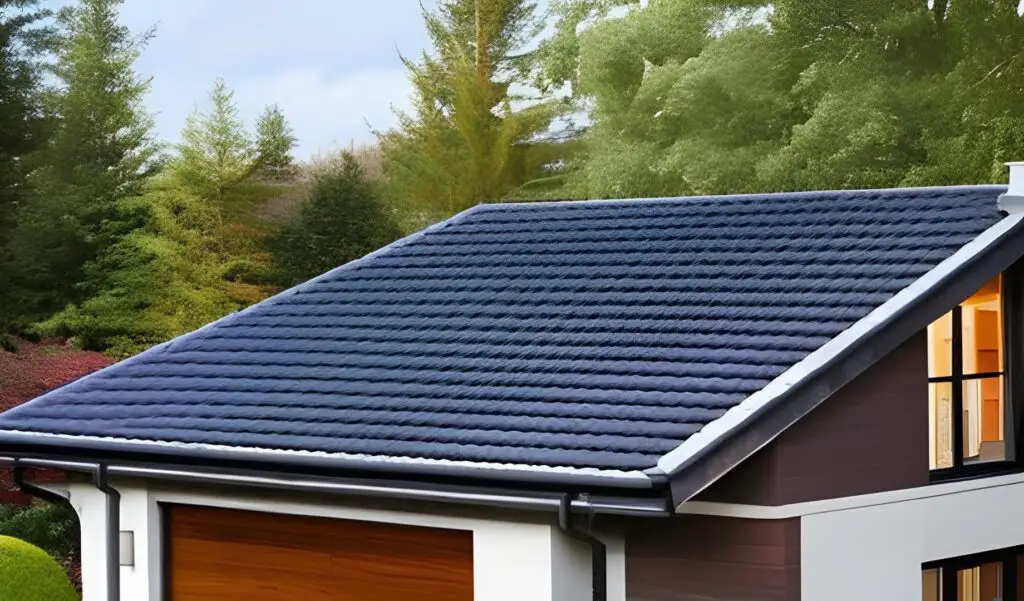
Comparing Composite Slate with Traditional Slate Roof Options
Composite slate is designed to mimic the appearance of natural stone but without the drawbacks associated with it. For instance, composite tiles weigh significantly less than their traditional counterparts, making them suitable for various structures of roof without requiring additional reinforcement. Additionally, they are more resistant to damage from hail or impact and have a higher fire rating compared to natural slate.
- Natural Stone: Heavyweight; requires reinforced structure; susceptible to breakage; high cost.
- Composite Slate: Lightweight; no need for structural reinforcement; increased durability; affordable pricing.
Warranty Information on Composite Slate Roofing
The longevity of your roofing investment is essential when choosing a tile material. Many manufacturers offer warranties on their composite slate products that can last up to 50 years or even provide limited lifetime coverage. One example is Brava Roof Tile, which offers premium quality composite roofing solutions backed by comprehensive warranty programs.
In addition to considering warranty information when selecting your material type, it’s crucial to also factor in other aspects like climate compatibility, specific pattern preferences, and ensuring optimal performance and lifespan for the entire roof system.
By weighing the pros and cons of each option carefully and consulting a professional contractor experienced in working with these materials, you can make an informed decision that best suits your needs and the architecture of your home.
Composite slate roof tile can be a great option for those looking to add beauty and value to their home, while still being cost-effective. A solar roof tile is the latest in energy-efficient technology, providing unparalleled savings when installed properly by experienced professionals.
Solar Roof Tile
A solar roof tile provides energy efficiency but requires specialty professionals for proper roof installation. These innovative solutions allow homeowners or professionals the opportunity to reduce electricity bills significantly while also contributing positively towards environmental sustainability goals.
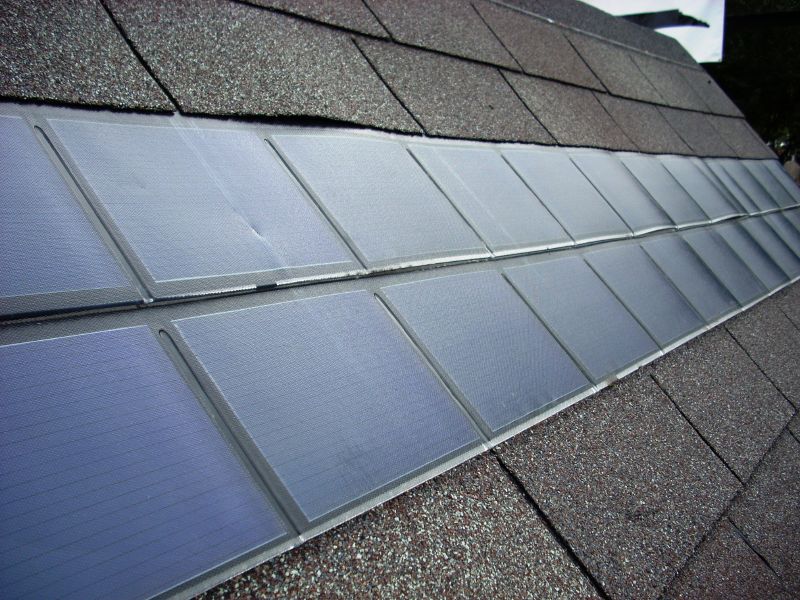
Energy-saving benefits solar tile technology provides
The main advantage of a solar roof tile is its ability to generate clean, renewable energy from sunlight. By utilizing solar roof tile, you can not only lower your utility bills but also reduce your carbon footprint by decreasing the need for fossil fuels. Solar tiles are designed to blend seamlessly with traditional materials, ensuring that aesthetics are not compromised while providing eco-friendly power generation.
- Reduced electricity costs: By generating a portion of your home’s electricity needs through solar power, you can save money on your monthly utility bills.
- Tax incentives and rebates: Many governments offer financial incentives for installing solar panels or solar roof tile, making it an even more cost-effective option.
- Increase property value: Homes equipped with solar power systems tend to have higher resale values due to their reduced operating costs and environmentally friendly features.
Importance of hiring experienced installers to ensure optimal performance
For optimal system performance, it is essential to hire a professional contractor who has expertise in roof installation of solar roof tile. An experienced installer will be able to assess the suitability of the structure of your roof and orientation for maximum sun exposure as well as identify any potential issues related to shading or obstructions that could impact system performance.
Furthermore, they will ensure that all components are properly installed according to the manufacturer’s guidelines and local building codes.
In addition to hiring a skilled contractor, it is crucial to choose high-quality solar roof tiles from reputable manufacturers. Companies like Tesla and CertainTeed offer durable, efficient solar roofing products backed by comprehensive warranties for peace of mind.
Solar roof tiles provide a distinct combination of energy-conserving advantages and attractive visuals, making them an excellent selection for numerous property owners. A clay roof tile also has its own advantages; they provide both historical charm and architectural compatibility.
Key Takeaway:
A solar roof tile provides energy efficiency and reduces electricity bills while contributing to environmental sustainability. Hiring experienced installers is crucial for optimal performance, and choosing high-quality solar roof tiles from reputable manufacturers like Tesla and CertainTeed can ensure durability and comprehensive warranties.
Clay Roof Tile
Since the mid-17th century, clay tiles have been a preferred choice for roofing along America’s Eastern coast, among other roof tiles types. Known for their versatility and aesthetic appeal, clay tiles come in various shapes like flat tiles or round with varying color options. Clay roof tile is appropriate for a variety of design styles, including Victorian, colonial and Tudor.
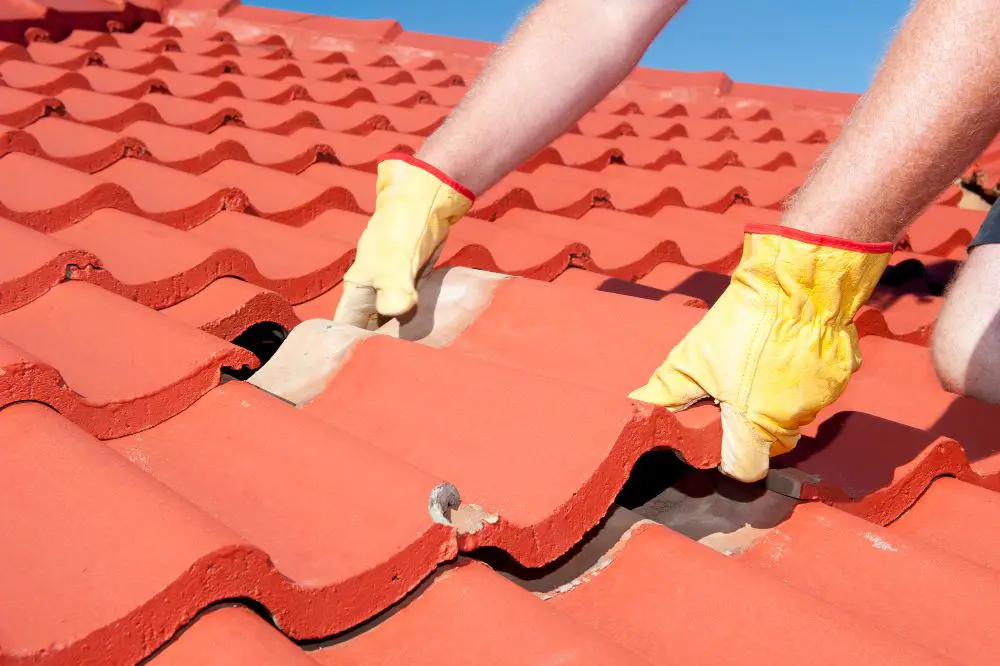
Historical Use of Clay Roof Tile
The use of a clay roof tile dates back centuries to ancient civilizations such as Greece and Rome. These durable materials were often used on temples and other important structures due to their ability to withstand harsh weather conditions while maintaining an attractive appearance over time.
Aesthetic Versatility and Architectural Compatibility
In addition to their historical significance, a clay roof tile offer homeowners a unique opportunity to customize their roofs according to specific architectural styles or personal preferences.
With options such as Spanish tile, barrel tile, or terra cotta colored tinted concrete available in today’s market, there is no shortage of choices when it comes to selecting the perfect fit for your home’s design needs.
However, despite these advantages, a clay roof tile do have some drawbacks that should be considered before making a decision. Due to their heaviness, this type of material can be prone to breaking under certain conditions, especially if not properly installed and maintained by a professional contractor who specializes in working with them.
Additionally, depending on the region where the house is located, climate factors may also play a role in determining whether this option is a viable long-term investment for protection purposes, given the potential vulnerability to freeze-thaw cycles causing damage over time, particularly in colder climate areas subject to frequent hail storms and heavy snowfall.
To ensure the longevity and performance of your clay tile roof, it is crucial to hire an experienced professional roofing contractor who specializes in working with these materials. A properly installed and maintained clay tile roof can last for many years, providing a beautiful and durable solution for your home’s exterior.
Clay roof tiles are a traditional and timeless choice for many homeowners, offering an aesthetic versatility that is difficult to match. Synthetic tile options provide additional environmental advantages while still providing the same warranty information as a clay roof tile.
Key Takeaway:
A clay roof tile have been used for centuries due to its durability and aesthetic appeal, with various shapes and colour options available.
However, they can be heavy and prone to breaking under certain conditions, so it’s important to hire a professional roofing contractor who specializes in working with these materials for proper installation and maintenance. With the right care, a clay roof tile can last for many years as a beautiful and durable solution for your home’s exterior.
Synthetic Tile Options
Synthetic tile options made from environmentally-friendly composite materials offer numerous benefits for homeowners and roofing professionals alike. These innovative products provide a sustainable alternative to traditional materials, while still delivering the durability and aesthetic appeal that many people desire.
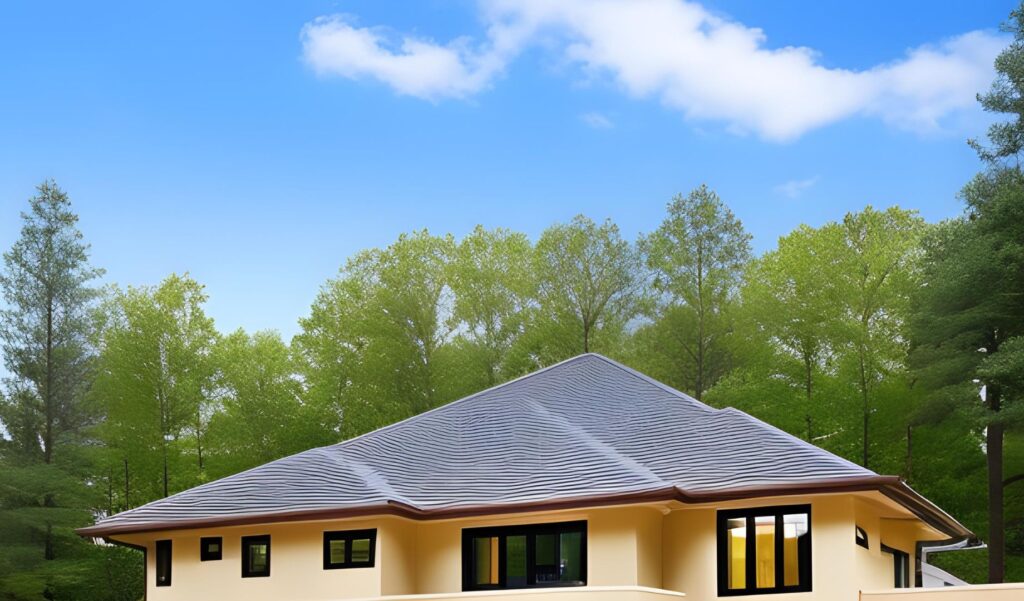
Environmental Advantages of Synthetic Materials
Synthetic tiles are crafted from recycled materials, which reduces waste in landfills and promotes a greener construction process. Additionally, these tiles are flame-retardant, making them an ideal selection for those worried about safety. Their lightweight nature also means less strain on the structure of your roof, potentially reducing the need for costly reinforcements or repairs down the line.
- Recyclable material reduces landfill waste.
- Fire resistance improves home safety.
- Lightweight design minimizes structural stress.
A Wide Range of Color Combinations Available
A wide selection of colors from different color options to complement any style of architecture can be found in synthetic tile options, making your roof both functional and aesthetically pleasing. This customization ensures that your new roof will not only be functional but also visually appealing – enhancing curb appeal and increasing property value.
Warranty Information on Synthetic Tile Options
In addition to their environmental advantages and aesthetic flexibility, synthetic tile roofs often come backed by impressive warranties provided by companies like Brava Roof Tile. With coverage lasting up to 50 years or even limited lifetime protection in some cases, investing in this type of roofing system can give you peace of mind knowing that your investment is protected for years to come.
Overall, synthetic tile options provide an eco-friendly and visually appealing alternative to traditional materials. By considering these innovative products for your next entire roofing project, you can enjoy the benefits of a durable, attractive roof while also contributing positively towards environmental sustainability goals.
Synthetic tile options provide a variety of advantages, from their environmental friendliness to warranties. It is important to hire specialized contractors for optimal results when choosing materials; consulting structural engineers may be necessary in some cases.
Key Takeaway:
Synthetic tile options made from recycled materials offer an eco-friendly and visually appealing alternative to traditional materials. These tiles are fire-resistant, lightweight, and come in a wide range of color combinations that can match any home’s architectural style perfectly. Additionally, a synthetic tile roof often comes with impressive warranties lasting up to 50 years or even limited lifetime protection in some cases.
Choosing a Professional Contractor
To ensure proper installation and longevity of your roof tile system, it’s crucial to hire an experienced professional contractor who specializes in working with these materials. Doing so will likely increase the overall project cost but ultimately result in a better outcome in terms of performance and lifespan. Structural engineers may also need to be consulted to determine whether the existing framing is able to support the additional weight of a new roof, especially if considering clay, concrete or slate options.
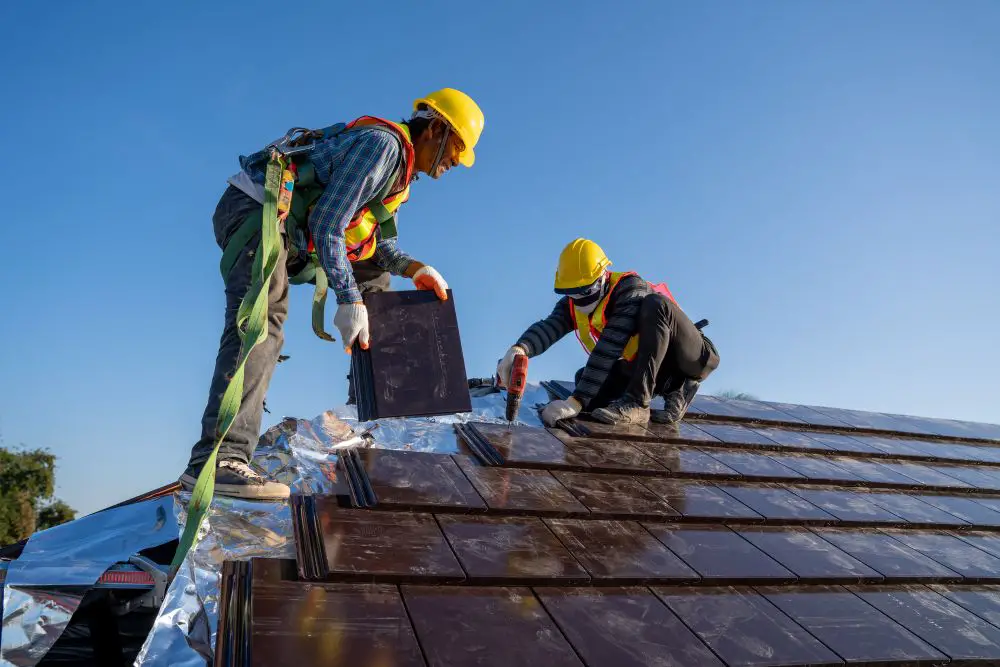
Importance of Hiring Specialized Contractors for Optimal Results
Hiring specialized roofing contractors ensures that they have extensive knowledge about various roof tiles types such as composite roof tile, solar roof tile, metal roof tiles and more. These professionals are well-versed with different materials like clay tiles or terra cotta and can provide expert advice on selecting the most suitable option based on factors like style of architecture, budget constraints and climate conditions. They are also equipped with necessary tools required for proper installation which minimizes chances of errors during construction process.
Consulting Structural Engineers When Necessary
- Evaluating Roof Structure: A structural engineer can assess the current structure of your roof, including its ability to bear the additional load from heavy materials like slate or concrete tiles.
- Slope Considerations: For sloped roofs where specific patterns need maintaining (such as Spanish barrel tiles), consulting an engineer helps ensure correct slope calculations while avoiding potential drainage issues. So, ensure to consult engineers on sloped roofs.
- Retrofitting Older Homes: If you are planning to install a roof tile on an older home, consulting with a structural engineer can help identify any necessary reinforcements or modifications needed for supporting the new roofing system.
In conclusion, choosing the right professional contractor and consulting with structural engineers when necessary is crucial in ensuring optimal performance and longevity of your roof tile. Not only will the installation of a roof tile improve the visual appeal of your property, but it can also ensure its resilience against extreme weather.
Key Takeaway:
To ensure a long-lasting and well-performing roof tile system, it is important to hire specialized roofing contractors who have extensive knowledge of different roof tiles types.
Structural engineers may also need to be consulted for assessing the current structure of your roof and making necessary reinforcements or modifications before installing heavy materials like slate or concrete tiles on older homes. This investment will not only enhance the aesthetics but also provide protection against harsh weather conditions in the long run.
FAQs in Relation to Roof Tiles Types
What are the Different Roof Tiles Types?
There are several roof tiles types, the popular types including slate, metal, concrete, composite slate, solar systems, clay roof tile, and synthetic tile systems. Each type offers unique advantages in terms of durability, aesthetics, and environmental benefits. To choose the best option for your project or home, explore various designs and consider factors such as climate and syle of architecture.
Which Roof Tiles Types are Best for a Roof?
The best roof tiles types for a roof depends on factors like location, budget, and desired appearance. Slate tiles offer longevity but can be expensive; metal roofs provide durability at a lower cost; clay tiles work well in coastal areas due to their resistance to salt air corrosion. Research each material’s properties before making your decision.
What are the Tiles on a Roof Called?
Rooftop materials used to cover buildings come in various forms known as “tiles.” These include options like slate, metal, concrete, or clay-based products designed specifically for roofing purposes. Tiles serve both functional (protection from elements) and aesthetic roles when installed on rooftops.
What is the Most Common Roof Tile Material?
The most common rooftop material varies by region due to availability and local preferences. In general, concrete tiles are popular worldwide for their affordability and durability. In the United States, asphalt shingles dominate the market, while clay tiles are prevalent in Mediterranean regions and slate is a common choice in Europe.
Roof Tiles Types – A Recap
In conclusion, there are many different roof tiles types available to choose from, each with its own advantages and disadvantages. From the classic look of slate tiles to the durability of concrete and clay options, homeowners and roofing professionals have a wide variety of materials to consider when building or repairing a roof.
When selecting the right roof tile types for your project, it’s important to weigh factors such as cost, maintenance requirements, climate considerations, and design preferences. With such a wide selection, finding the ideal roof tile for your project is simpler than ever.
If you’re looking for more information about roof tiles types or need help choosing the right material for your next project, be sure to visit myrooff.com, where our team of experts can provide you with all the guidance you need.
